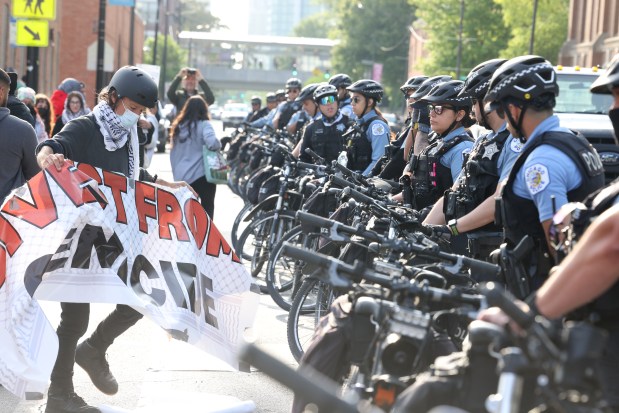Alongside fellow protesters, a DePaul University senior lived in one of a sea of small tents on the quad for a little over two weeks, until police on Thursday cleared out the pro-Palestinian encampment — the last one standing on a Chicago-area college campus.
To the 22-year-old peace and conflict studies major, the campus protests against the Israel-Hamas War in Gaza and its ensuing humanitarian crisis have been inherently connected to university protest movements of the past, with echoes of student uprisings against the Vietnam War and other conflicts throughout history.
“There are so many historical parallels to be drawn, from not only the strategies of organizers and the demands of organizers but also the responses of administrations,” said the DePaul student, who wanted to be identified only by his first name, Ethan, for fear of harassment or reprisal. “I don’t think we can separate ourselves from the struggles of the past.”
The hard-line reaction of many university officials has been particularly reminiscent of widespread college leadership opposition to anti-war demonstrations during the Vietnam era, said Ethan, who described himself as an anti-Zionist Jew and a member of the DePaul student group Jews 4 Justice.
A similar encampment was dismantled by police at the University of Chicago earlier this month. U. of C. students and alumni also briefly occupied the university’s Institute of Politics Friday to protest the war and demand the university divest itself of financial assets tied to Israel, but the demonstrators were removed by university police.
DePaul officials have cited more than a thousand complaints of discrimination and harassment over the course of encampment on their campus — including one death threat — as well as an estimated $180,000 in vandalism of buildings and structures allegedly caused by protesters.
“From the beginning of the encampment, I have said that we would protect free speech and the ability to dissent until it either prevented us from carrying out the operations of our university or threatened the safety of the members of our community,” said DePaul President Rob Manuel last week, adding that the encampment had “crossed that line.”
The school also released photos of several weapons found at the encampment, including knives and a pellet gun. The Anti-Defamation League Midwest supported DePaul’s decision, saying the encampment created an “unsafe environment for Jewish students.”
Several other schools nationwide, including Northwestern University, reached agreements with pro-Palestinian protesters, though student activists at Northwestern insisted they would “not stop fighting until we get a free Palestine,” according to one demonstrator.
Northwestern University President Michael Schill is scheduled to testify before Congress on Thursday, along with leaders of Rutgers University and the University of California, Los Angeles, in a hearing titled “Calling for Accountability: Stopping Antisemitic College Chaos.”
“History has shown us to follow the lead of young people,” Elizabeth Shakman Hurd, a professor of political science and religious studies and member of Northwestern University Educators for Justice in Palestine, said in a recent statement. “It is young people who spoke out clearly against the brutal war on Vietnam. … Yet again we must follow the lead of the young people who are calling for an end to genocide.”
U.S. Sen. Bernie Sanders, a Vermont independent, mirrored these sentiments earlier this month while championing pro-Palestinian encampments at colleges across the country.
On the Senate floor, the progressive leader and University of Chicago alum warned that the war in Gaza could become President Joe Biden’s Vietnam, adding that former President Lyndon Johnson had declined to run for reelection in 1968 amid anti-war opposition.
Sanders noted that “protesting injustice and expressing our opinions is part of our American tradition.”
“Across the country, students and others, including myself, joined peaceful demonstrations in opposition to the war in Vietnam. Those demonstrators were demanding an end to that War,” he said. “And maybe — just maybe — tens of thousands of American lives and countless Vietnamese lives might have been saved if the Government had listened to those demonstrators.”
Historians agree there are a number of similarities between the two college protest movements, including themes of international injustice as well as a backdrop of broader criticism of American higher education systems.
However, the pro-Palestinian encampments have been much smaller “both in terms of the number of campuses and percentages of students involved,” compared with the anti-Vietnam war demonstrations of the 1960s and early 1970s, said Robert Cohen, professor of history at New York University and the author of several books about free speech on college campuses.
While anti-Gaza-war demonstrations have grown into the largest college-initiated protest movement of the 21st century, only a fraction of student bodies are participating at around 50 to 100 schools across the country, Cohen estimated.
In comparison, roughly 4 million students, “almost half of the student population at over a thousand campuses,” demanded an end to the Vietnam War decades ago, he said.
That overseas war in some ways felt closer to home, Cohen noted, because many students feared getting drafted.
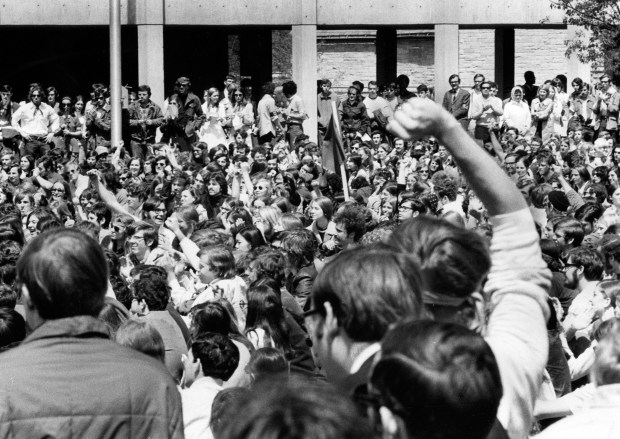
“Also the tactics which have been involved are moderate today,” he said, adding that some anti-Vietnam War protests turned violent and included the torching of ROTC facilities. “People are acting like this is the 1960s again. But they don’t remember, really, what the 1960s were like then.”
Although the scope and magnitude aren’t equal, the negative reaction of many college officials to the encampments has echoed university administrator backlash against Vietnam demonstrations, said Ralph Young, history professor at Temple University in Philadelphia and author of the book “Dissent: The History of an American Idea.”
Young said that, generally, university efforts to quell protest tend to backfire, emboldening the student activists and inflaming the demonstrations.
“Whenever a university employs heavy-handed tactics to remove protesters, it only increases the protest,” added Young, who said he had demonstrated in favor of civil rights and against the Vietnam War during his youth.
‘Battle for hearts and minds’
Former University of Illinois Chicago professor and Vietnam War-era radical Bill Ayers recently spoke at the pro-Palestinian encampment at the University of Chicago, which he described as a peaceful and loving “utopian community.”
These protests have “massively changed the conversation in this country” about the war in Gaza as well as the university’s role in society, said Ayers, who was a controversial figure during former President Barack Obama’s presidential campaign.
“Winning is changing the narrative, often,” added Ayers, co-founder of the anti-Vietnam war group Weather Underground, who had written in his memoir about helping with the nonfatal bombings of governmental buildings. “And that’s critically important. It’s important to the future of the United States. It’s important to the future of the Middle East.”
Experts have been debating the long-term impact the college encampments might have on U.S. foreign policy as well as public opinion on the war in Gaza.
Steven Mintz, a professor of history at the University of Texas at Austin, said he believes the “breadth of support” on campuses was far greater during anti-Vietnam War protests.
“Today’s campuses are far more diverse than they were half a century ago, and, as best I can tell, the overwhelming majority of students are not focused on the protests,” he said. “Another difference is that today’s movement has few clearly identifiable (and therefore accountable) leaders. One result is little message discipline, which has created an environment in which the most extreme voices are widely reported as if they speak for all protesters. … My sense is that the (pro-Palestinian) protests are not winning the battle for hearts and minds.”
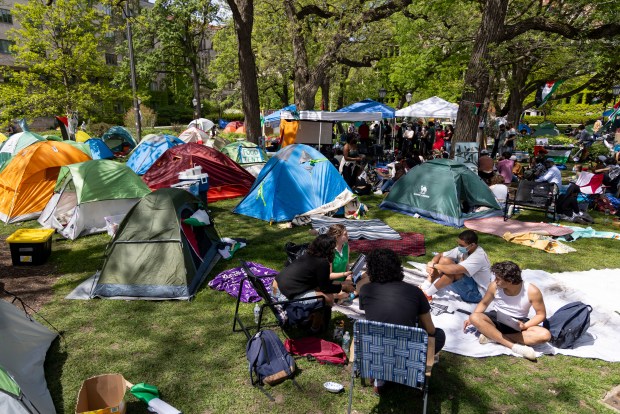
Nearly half of American adults oppose these recent pro-Palestinian college protests and only 28% expressed support, according to a YouGov poll released earlier this month. About a third of survey respondents said college administrators have been “not harsh enough” in their response to the demonstrations, and 16% felt school leaders have been “too harsh.”
Many campus protesters, including those at DePaul, have called on their universities to divest from companies with direct or indirect ties to Israel; yet almost a third of Americans surveyed in the recent poll believe this divestment demand is “unjust and infeasible,” whereas only 12% said it was “just and feasible,” according to the poll.
But Cohen said this is pretty typical: Most college protests throughout history were unpopular at the time among the general public.
“One other thing you should know about student movements is they’re never popular off campus,” he said. “No matter how nonviolent, respectable and beautiful their goals are.”
Echoes of anti-apartheid protests
To Cohen, the size of the pro-Palestinian protests and some of the tactics have much in common with the movement against South African oppression in the 1980s, when college students across the country — including the Chicago area — demanded universities end investments in corporations linked to the apartheid system.
“They were similar in terms of scope as what’s happening today,” he said.
Northwestern University alum Barbara Kancelbaum, who was a steering committee member of the Anti-Apartheid Alliance at the school in the 1980s, recalled anti-apartheid demonstrations on campus “started small but quickly grew to many hundreds of students and faculty, which was incredibly inspiring.”
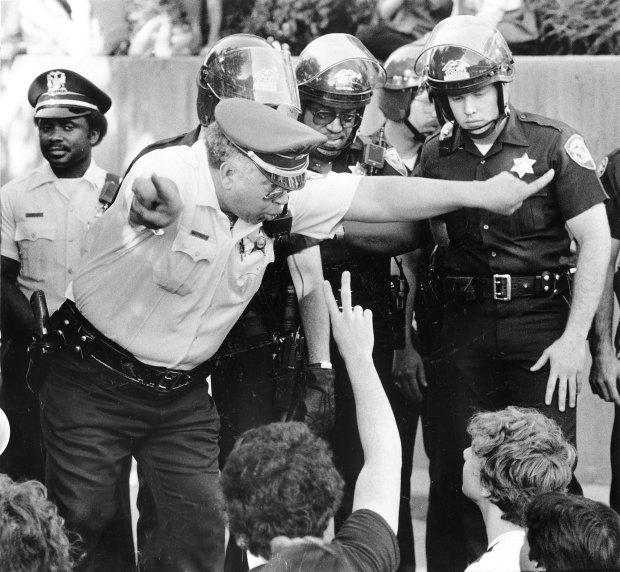
At one point, several dozen students camped out for a few weeks in a makeshift shantytown in the school’s administration center, she recounted.
“Like today’s protests, the movement sprung from students rapidly becoming aware of conditions for people across the globe, which they may not have previously understood,” she said. “To me, the largest similarity between today’s protests and the ’80s is students becoming rapidly politicized and willing to give up their own comfort, time, and at times their family’s approval — sleeping in tents, missing class and so on, in order to stand up for people they’ve never met and for what they believe in.”
Yet she acknowledged that the current protests revolve around a much more complex issue, adding that both sides of the ongoing war have committed atrocities.
Israel declared war after an Oct. 7 surprise Hamas attack killed roughly 1,200 Israelis, who were mostly civilians. Gaza health officials say more than 35,000 Palestinians, also mainly civilians, have been killed since the war began.
Kancelbaum added that the pro-Palestinian protesters “are focusing on an issue that has a much more complicated resolution.”
Antisemitism accusations
At many universities, donors and lawmakers have also advocated the suppression of the pro-Palestinian demonstrations, in part by tying them to antisemitism and harassment, Cohen said.
“It’s been seen as antisemitism and — I think in an exaggerated way — associated with hatred,” he said, adding that while he might not agree with everything the protesters say, their right to demonstrate is central to the mission of higher education and learning.
“So there’s a lot of pressure on these college administrations to suppress these encampments,” Cohen said. “My concern about that is what happens to free speech when you suppress unpopular movements?”
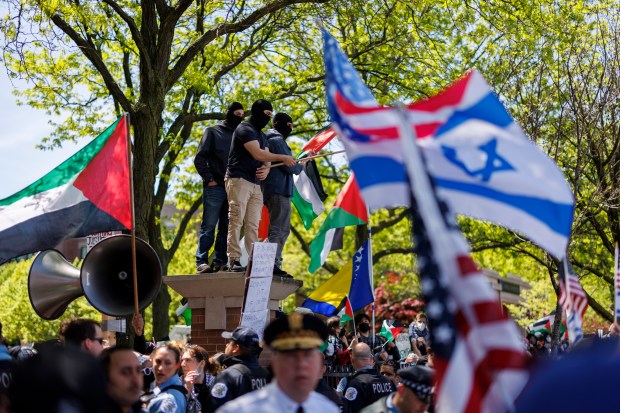
Many higher education institutions across the country were already grappling with accusations of antisemitism before the encampments took hold, a climate that prompted several prominent college leaders to quit under fire.
The presidents of Harvard University and the University of Pennsylvania resigned amid backlash from their testimony during a heated congressional hearing on antisemitism at college campuses in December; Harvard’s president had also faced plagiarism accusations around the same time.
The U.S. Department of Education in January launched a probe into antisemitism accusations at Northwestern University, one of many similar ongoing investigations at colleges and universities around the country. Northwestern officials said in a statement that the school “does not tolerate antisemitism or discriminatory acts.”
Several Jewish Northwestern students recently filed a lawsuit against the school for allowing pro-Palestinian demonstration there to become “increasingly hostile to Jews”; seven members of Northwestern’s President’s Advisory Committee on Preventing Antisemitism and Hate also recently stepped down to protest the university’s agreement with pro-Palestinian demonstrators.
“These encampments are not intended to support peace or even peaceful dialogue,” Rebecca Weininger, assistant regional director of advocacy for the ADL Midwest, said at a news conference earlier this month. “They are platforms for antisemitism and their participants threaten and harass Jewish students.”
‘Teaching moment’
While the ongoing campus protests are focused on the war in Gaza, “they’re also a manifestation of the lack of democratic governance at universities,” Cohen said.
The pro-Palestinian demonstrations are as much a critique of American university systems as international affairs, another similarity to anti-Vietnam War protests and other student-led uprisings, where young people questioned university authority and championed their right to free speech, he said.
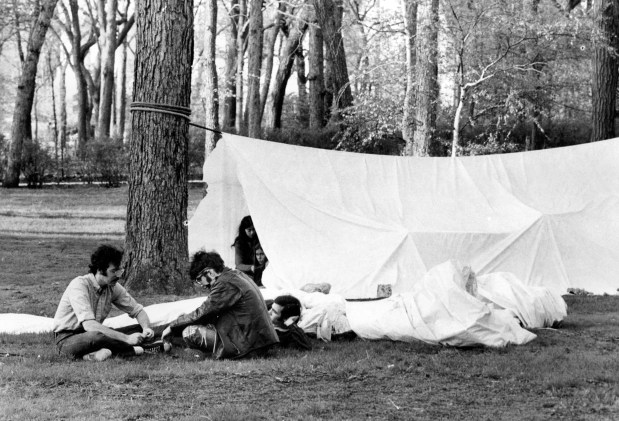
Students are demanding more transparency in terms of school budgets, policies and governance; many universities have large boards with little or no student representation, leaving students to feel they have no voice, Cohen added.
Nationwide, college students and faculty members have also become more concerned with “the corporatization of higher education,” and that sentiment is also fueling these protests, Young said.
“Administrators and universities seem to be run more like a corporation, with a CEO and chief financial officer,” he said. “So much of the money and the budget of a university is about administration, and not enough for faculty and students and other things.”
Many detractors also criticize higher education institutions as being too consumed with finances and donations, while “losing some of its mission of educating students about free speech and critical thinking and learning about things that make you uncomfortable,” Young said.
Rather than suppress or rebuke these pro-Palestinian demonstrations, Young argues that colleges should embrace them as a chance to explore concepts like international affairs, history, free speech and higher education systems.
“The purpose of an education is to shake you out of your complacency and your basic assumptions and stereotypes … to make you think more broadly about things that are happening in the world,” he said. “A protest itself can be an educational thing. A teaching moment.”


